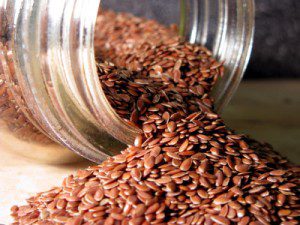By Sayer Ji
Contributing Writer for Wake Up World
With October being Breast Cancer Awareness month,[1] one cause that most likely won’t be marketed to us is that of women taking back control of their health by consuming more cancer-fighting foods. In years past, Smith & Wesson’s pink hand gun and KFC’s “buckets for the cure,”[2] have made the list of approved ‘pink’ products, but nowhere does one find fund-raisers and races for better access to and consumption of the extensive list of foods that increasingly science has vetted as actually preventing and/or killing breast cancer. [3]
[pro_ad_display_adzone id=”110028″]
All the more reason why a new meta-analysis on flaxseed and breast cancer published in the journal Integrative Cancer Therapy this month is so timely.[4] The review was no small undertaking, as it obtained its findings by sorting through 1,892 records from a variety of biomedical databases, including MEDLINE, Embase, the Cochrane Library, and AMED from inception to January 2013, concerning any available human interventional or observational data pertaining to flax and breast cancer.
They discovered the following benefits of flaxseed among newly diagnosed breast cancer patients:
- Decreases in hot flash symptomatology
- Increased cell death (apoptosis) within their tumors
- Decreased HER2 expression (a protein associated with breast cancer malignancy)
- Decreased breast cancer proliferation
Additional findings among uncontrolled and biomarker studies included:
- Improved atypical cytomorphology (i.e. normalization of cells)
- Improved mammographic density
- Possible anti-angiogenic actiactivity (i.e. anti-invasive properties)
Finally, observational data suggested the consumption of flaxseed:
- Decreased risk of primary breast cancer by 18%
- Improved mental health by 76%
- Lowered mortality among breast cancer patients by 32%
The study authors concluded:
Current evidence suggests that flax may be associated with decreased risk of breast cancer. Flax demonstrates antiproliferative effects in breast tissue of women at risk of breast cancer and may protect against primary breast cancer. Mortality risk may also be reduced among those living with breast cancer.
These findings, of course, are extremely valuable to women, many of whom have been wrongly lead to believe that the #1 most important step in breast cancer prevention is “early detection” via x-ray based breast screenings – as if the point is to watch and wait for the juggernaut of genetically-based cancer to unfold within their bodies, and ‘catch it early’ if you can.
Truth be told, never before have so many women been at so great a risk of unnecessary harm from breast screening, due to the millions of dollars of cause marketing propaganda that assault them year around in myriad products and services ostensibly put in place to help ‘raise awareness,’ or ‘raise money to raise awareness,’ as to why they should participate in the dangerous ritual of mammography. Ironically, and tragically, it is now firmly established (but still widely unknown) that participating in conventional breast screenings increases breast cancer mortality, as a direct result of it generating countless cases of misdiagnosed and mistreated ‘cancer’ in healthy women every year [1.3 million causes in the U.S. over the past 30 years]. Never before have women so desperately needed an alternative path towards breast cancer prevention, beyond subjecting themselves, as a “preventive” measure, to annual or bi-annual doses of highly carcinogenic mammography radiation – a screening procedure that we now know mostly detects harmless lesions known as ductal carcinoma in situ (DCIS), and that a National Cancer Institute commissioned panel recently suggested should not even be called cancer, owing to its intrinsically harmless or indolent nature.
Flaxseed is actually only one of hundreds of natural foods, spices and substances that have proven anti-breast cancer activity, even among drug-resistant and multi-drug resistant breast cancer cell lines. Visit our database on natural breast cancer research to learn more, and take a look at some of the recently featured anti-breast cancer substances we have written about:
- Breast Cancer Gene (BRCA1) Malignancy: Its Not IN The Genes, So Much As WHAT You Expose Them To
- Confirmed: Flaxseed Contains ‘Estrogens’ That Regress Cancer
- Research: Curcumin Is A Triple Negative Breast Cancer Killer
- Green Tea Changes Estrogen Metabolism and Breast Cancer Risk
- If You’re Concerned About Breast Cancer…What You Must Know
Also, read Cancer Killers: The Cause is the Cure, a book co-authored by Sayer Ji, Dr. Ben Lerner and Dr. Charles Majors.
Updated September 2014
Article Resources
[1] Learn about the Dark Side of Breast Cancer [Un]Awareness Month
[2] Note: The acrylamide in fried chicken has been linked to increased breast cancer risk.
[3] GreenMedInfo.com, Health Guide: Breast Cancer
[4] Gillian Flower, Heidi Fritz, Lynda G Balneaves, Shailendra Verma, Becky Skidmore, Rochelle Fernandes, Deborah Kennedy, Kieran Cooley, Raimond Wong, Stephen Sagar, Dean Fergusson, Dugald Seely. Flax and Breast Cancer: A Systematic Review. Integr Cancer Ther. 2013 Sep 8. Epub 2013 Sep 8. PMID: 24013641
Further articles by Sayer Ji
- The Cancer-Causing Metal Millions Eat, Wear or Have Injected Into Their Kids
- Turmeric Superior to Chemical Mouthwash In Improving Oral Health
- Biophotons: The Human Body Emits, Communicates with, and is Made from Light
-
The 2013 Measles Outbreak: A Failing Vaccine, Not A Failure To Vaccinate
- 3 Evidence-Based Ways To Reverse Skin Aging Naturally
-
Why Is The Food Industry Poisoning Us With Trillions of Nanoparticles?
- How to Clean Your Arteries With One Simple Fruit
- 13 Evidence-Based Medicinal Properties of Coconut Oil
About the author:
 Sayer Ji is the founder and director of www.GreenMedInfo.com and an advisory board member at the National Health Federation, an international nonprofit, consumer-education, health-freedom organization.
Sayer Ji is the founder and director of www.GreenMedInfo.com and an advisory board member at the National Health Federation, an international nonprofit, consumer-education, health-freedom organization.
He co-authored the book Cancer Killers: The Cause Is The Cure, and is currently co-authoring another book with Tania Melkonian entitled EATomology: An Edible Philosophy of Food.
Check out Sayer Ji’s new collaborative project EATomology.
[pro_ad_display_adzone id=”110027″]







